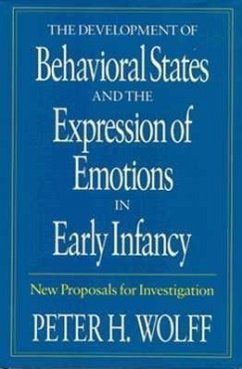Peter H. Wolff, a world-renowned authority on infant behavior, helped lay the foundation for the field in the 1960s with his innovative studies of behavioral studies, motor coordination, smiling, and crying in infancy. Some twenty years later, as infancy studies have become increasingly specialized and fragmented, he calls for new theoretical perspectives and methods of investigation. Applying ethological methods used in field studies of animal behavior, Wolff first observes how babies behave in the "natural" ecology of their homes to catalog their species-typical behavioral repertory and then manipulates their behavior through informal experiments designed to examine functional significance. Wolff argues that a coherent psychobiological theory of early human development must begin with knowledge about the infant's behavioral repertory under free field conditions. Many current theories of human development begin instead with assumptions about the organization of behavior derived from studies of psychological function in the adult; moreover, they appeal to instincts, maturational programs, or genomes to explain the apparent lawfulness in the development of these behavioral categories. Such a priori explanations, Wolff contends, beg the whole question of development. As an alternative to theoretical metaphors that portray the infant as a closed system and suggests that development is controlled by prescient programs that anticipate the mature steady state, Wolff proposes a metaphor of the infant as an open, self-organizing system with partial, mutative mechanisms of development. Applying this metaphor, he addresses the essentially unsolved problem of how novel behavioral forms areinduced during ontogenesis. Wolff presents a study of twenty-two infants who were observed for thirty hours each week in their homes during the first months after birth. He builds a week-by-week description of changes in behavioral states of wakefulness and examines how re
Bitte wählen Sie Ihr Anliegen aus.
Rechnungen
Retourenschein anfordern
Bestellstatus
Storno








